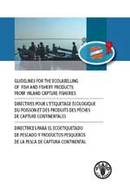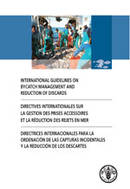Publications
These technical guidelines on the use of wild fish as feed in aquaculture have been developed in support of Article 7 (responsible fisheries management) and Article 9 (aquaculture development) of the FAO Code of Conduct for Responsible Fisheries, and in particular in support of Articles 9.1.3, 9.1.4 and 9.4.3. The objectives of the guidelines are to contribute towards the development of aquaculture and the sustainable utilization of feed-fish stocks. The guidelines cover a number of...
More than 46 percent of the total global aquaculture production in 2008 was dependent upon the supply of external feed inputs. For the aquaculture sector to maintain its current average growth rate of 8 to 10 percent per year to 2025, the supply of nutrient and feed inputs will have to grow at a similar rate. This had been readily attainable when the industry was young. It may not be the case anymore as the...
The Guidelines for the Ecolabelling of Fish and Fishery Products from Inland Capture Fisheries are of a voluntary nature. They are applicable to ecolabelling schemes that are designed to certify and promote labels for products from well-managed inland capture fisheries and focus on issues related to the sustainable use of fisheries resources. The guidelines refer to principles, general considerations, terms and definitions, minimum substantive requirements and criteria, and procedural and institutional aspects of ecolabelling of...
These International Guidelines on Bycatch Management and Reduction of Discards were developed through a participatory process involving fisheries experts, fishery managers from governments, the fishing industry, academia and non-governmental and intergovernmental organizations.
The guidelines are designed to provide guidance on management factors ranging from an appropriate regulatory framework to the components of a good data collection programme, and include the identification of key management considerations and measures necessary to ensure the conservation of target and non-target...
Global production from aquaculture is growing substantially and provides increasingly significant volumes of fish and other aquatic food for human consumption, a trend that is projected to continue. Although aquaculture growth has potential to meet the growing need for aquatic foods and to contribute to food security, poverty reduction and, more broadly, to achieving sustainable development and the Millennium Development Goals, it is increasingly recognized that improved management of the sector is necessary to achieve...






